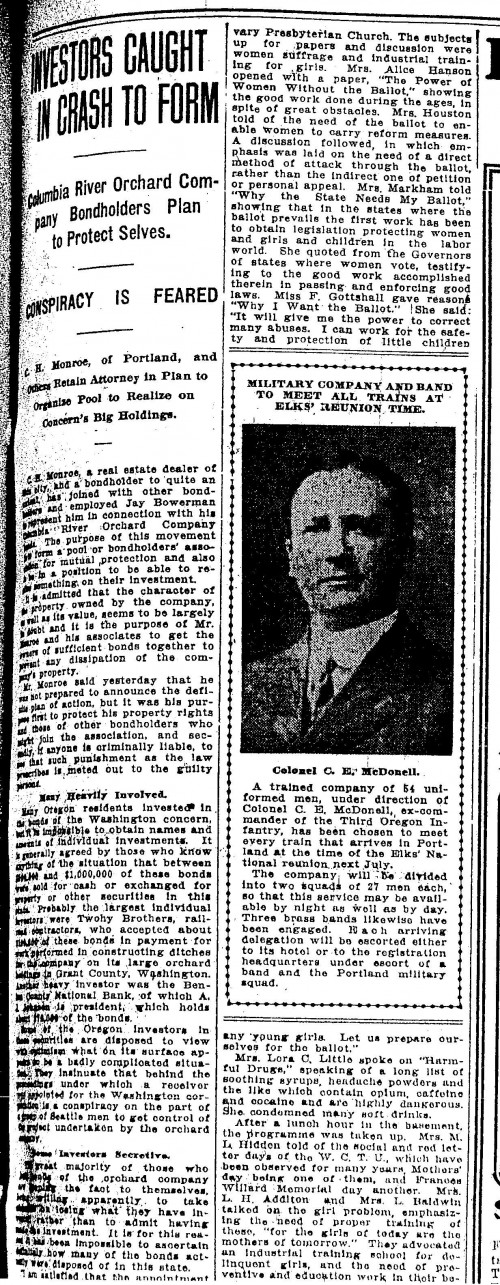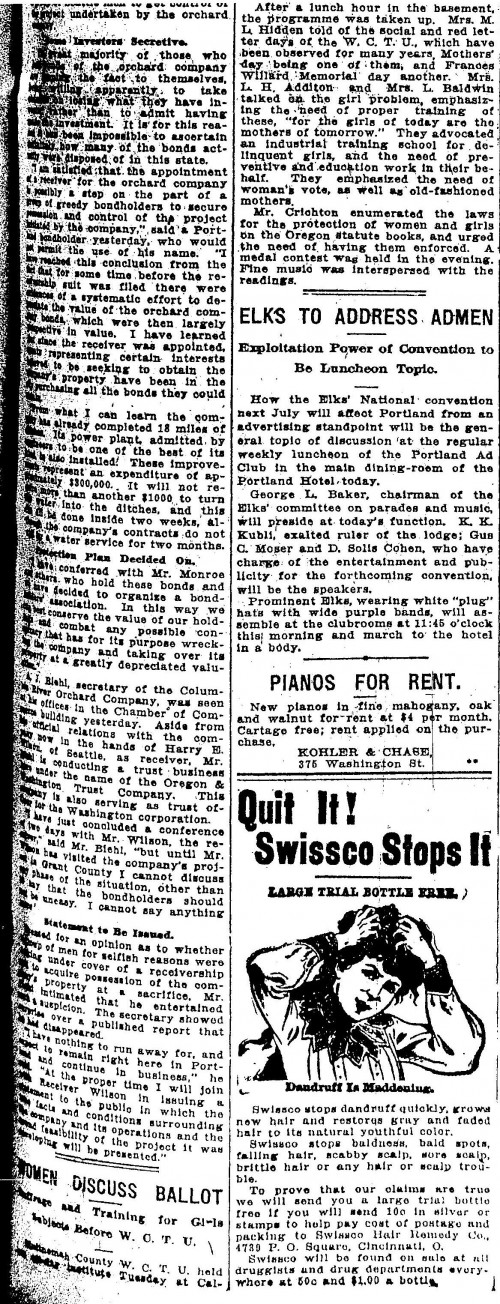ROOSEVELT MADE FUN OF BY WOMEN
Suffragist Says His Editorial for Cause is Superficial and Sloppy.
HE’S DUBBED “GREAT OOM”
Mrs. J. G. Gauld Is Hostess in Reception for Leaders of California Campaign—200 Hear Plea for Cause of Equal Rights.
Referred to as “The Great Oom of the Outlook and of Oyster Bay, who has told the farmers’ wives how to dress and the stork how to fly,” laughter and sarcasm were heaped upon Theodore Roosevelt by members of the Portland Equal Suffrage League last night when they gathered at the residence of Mrs. J. G. Gauld, at 252 King street, to hear the leaders who were prominent in marshalling the women suffrage forces in California to victory last Fall.
The reference to Colonel Roosevelt was made in connection with an editorial by him appearing in a recent edition of the Outlook, in which he espoused the suffrage cause. Mrs. Helen Hay Greely, woman lawyer and representative of the New York Equal Suffrage League said:
“In a six-page editorial in the Outlook, he was flopped again. We do not, however, regard him as an important addition to our ranks. The editorial is superficial and it is sloppy, and you don’t have to read more than three pages of it to see just how sloppy it is.”
Some 200 persons attended the meeting, including a number of prominent business men. William D. Wheelwright acted as chairman of the evening and introduced the speakers, who, besides Mrs. Greely, were Miss Anita Whitney of San Francisco, and President Foster was announced to speak against the suffrage cause. Mrs. Solomon Hirsch, president of the league, and Mrs. Andre Fouilhoux, its secretary, arranged the details of the meeting.
Votes Held as Protection
Mrs. Greely, the first speaker, made an ardent plea for the ballot for woman as the one means whereby she could obtain better conditions for the more unfortunate of her sex.
“We do not pretend that the ballot for women will prove a panacea for all ills, “ she said. “The ballot for woman is merely giving the working girl that protection that not a working man or a business man in Portland would be willing to give up if a move were made to take it from him. It is the carrying out of the doctrine that that man of sorrows, that man of grief, preached to the multitudes, that they were to love their neighbors as themselves.
“Just as men,” she said, “who sit in their offices and are willing to grow rich on the earnings of girls and children, who are compelled to consume their life’s vital spark in toil at starvation wages commit murder at longing and introduced the speakers, who besides Mrs. Greely, were Miss Anita Whitney, of San Francisco, and President Foster, of Reed College. President Foster was announced to speak against the suffrage cause. Mrs. Solomon Hirsch, president of the league, and Mrs. Andre Fouilhoux, its secretary, arranged the details of the meeting.
Votes Held as Protection.
Mrs. Greely, the first speaker, made an ardent plea for the ballot for woman as the one means whereby she could obtain better conditions for the more unfortunate of her sex.
“We do not pretend that the ballot for women will prove a panacea for all ills,” she said. “The ballot for woman is merely giving the working girl that protection that not a working man or a business man in Portland would be willing to give up if a move were made to take it form him. It is the carrying out of the doctrine that that man of sorrows, that man of grief, preached to the multitudes, that they were to love their neighbors as themselves.
“Just as men,” she said, “who sit in their offices and are willing to grow rich on the earnings of girls and children, who are compelled to consume their life’s vital spark in toil at starvation wages commit murder at long distance, the women who sit comfortably at home and are indifferent., commit murder at long distance by refusing to assist in a cause that will redeem and help these poor fellow members of humanity.
Help for Workers Seen.
“The working girl with the ballot will get just a little more attention from her employers when she demands no night work and no nerve-racking labor at long hours. By our having the ballot we can help them.”
She compared civic communities to large families that have been going along “on one leg” because they have had no mother at the head of them—gave to the woman with the ballot the place of the mother in the family. She said that women did not want to become identical with men. They wanted to help their own. Sex, she said, and they wanted to have a great deal to say about prevention before it became necessary to correct. She said their objects would take a long time to accomplish and would not be done in a generation.
Miss Whitney told how the suffrage movement was sweeping around the world, citing the abolition, by imperial edict, of bound feet in China and the doing away with veils by the women of Turkey, in support of her assertions. She denied that the ballot in the hands of woman is undignified.
“The ballot,” she said, “is a silent expression of opinion on a stated question on a certain day. Who will tell me that a silent expression of opinion is unwomanly?”
Opposition Laid to Sentiment.
President Foster, in speaking against women’s suffrage, said that in his experience the side of the opposition was not so much a matter of argument as of sentiment.
“Yet,” he said, “I believe that sentiment is well founded. The suffragists I have come to believe, from the close study I have made of the subject, have all the argument in their favor. If a man were to oppose it on the merits of argument wholly he would surely hang himself.”
Refreshments were served after the meeting by Mrs. Gauld, the hostess. Mrs. Greely and Miss Whitney expect to do active work in the state in the suffrage cause during the coming campaign.






